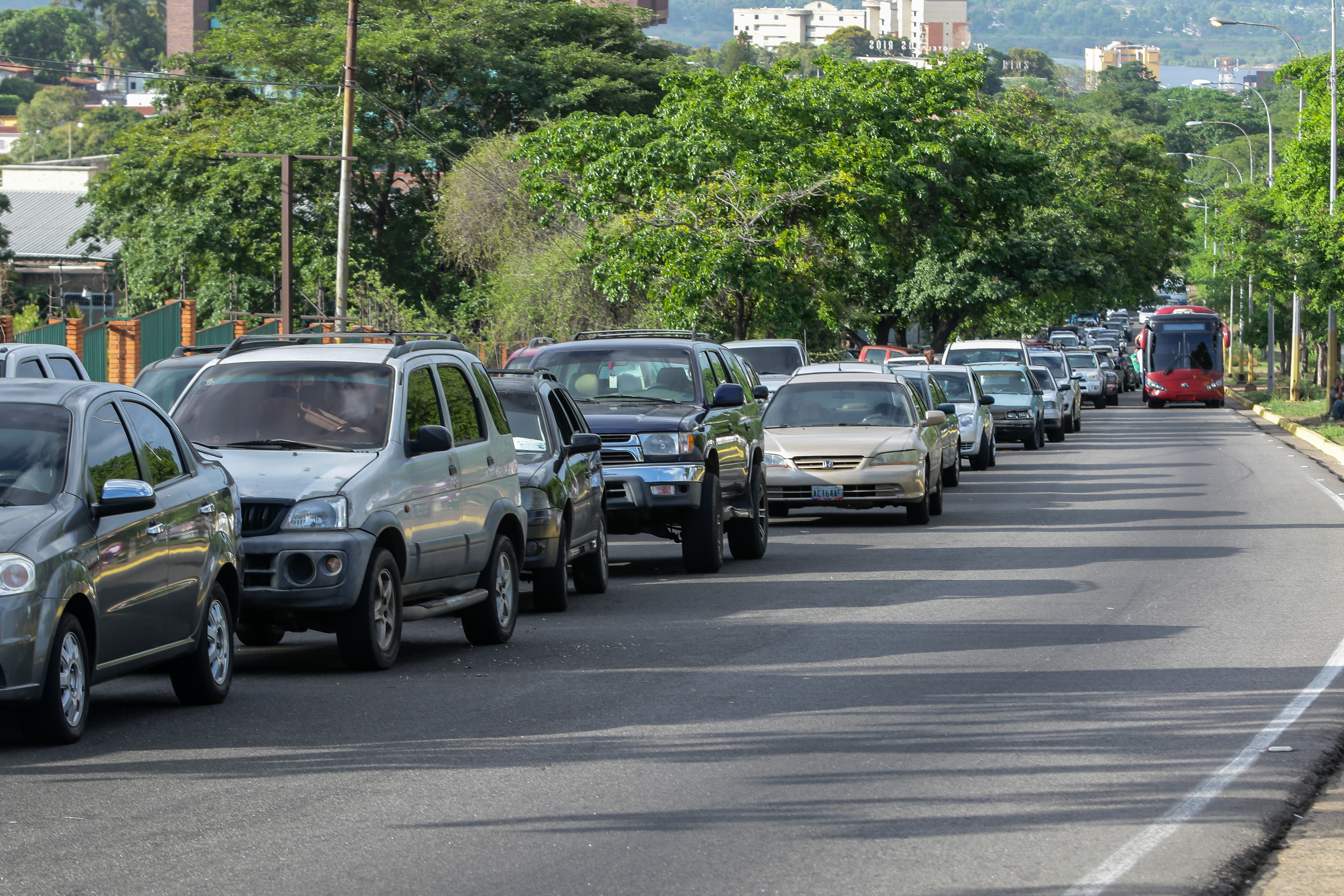96 Hours in Line for Fuel
The fuel crisis reaches the Venezuelan south, drivers in Bolivar State spend between 24 to 96 hours waiting to fill up their tanks. New social habits and political tricks converge in the new normality of this oil-producing country without fuel.


Photos: William Urdaneta
2.30 a.m., the alarm rings and a long day begins.
Mission for the day: filling up a tank of gas in the oil-producing nation of Venezuela, a daunting task since mid-May in Bolivar. Although other states like Zulia and Merida have years of experience queueing up for fuel, we in the south are just crashing into this reality, another consequence of PDVSA’s production downturn.
According to the oil company’s official figures, 325,000 oil barrels a day are required to cover the national demand, yet all oil unions agree that the refineries of El Palito, Amuay and Punta Cardón are operating below 20% of their capacity. That’s a daily supply of merely 100,000 barrels.
The first thing we notice on our way to the station is the unusual amount of vehicles moving through the streets, even though Ciudad Guayana is quite a violent city. Normally, the streets are empty by 6:00 p.m, but today we drive in darkness, hoping against hope to get a break.
After touring several colossal lines, we stop in the one we know gets supplied. We’re with a few friends, because queueing up for fuel is now a get together. We see makeshift fires, domino tables, barbecues and lots of coffee thermos. It’s 3:00 a.m., and although the Governor’s Office banned lines at gas stations between 10:00 p.m. and 4:00 a.m., there are 700 vehicles before us.
The regional government has created two supply methods, first by even and odd license plate numbers and, more recently, by the last plate digits. Lines just keep growing because, whatever your method is, there are still shortages. Out of the 26 gas stations in Bolivar, only 11 are regularly filled.

Long lines for fuel are the new normal in Ciudad Bolivar. Photo: William Urdaneta,
There are variables at play, of course: one of the essential components for mining in the south is gas. For years, smuggling has thrived on cheap fuel, so when filling tanks gets harder, illegal fuel transactions flourish. In the most extreme cases, there are people selling a litre of gasoline for $3.
Your place in line also has a price: a spot among the first three vehicles costs between $7 and $10. There are some claiming they’ve paid $20 to soldiers guarding the stations, to get ahead. This cesspool of illegality and impunity has spawned a broad range of abuse around the simple act of filling your tank. Bus drivers say that, due to their job, they need gas and they can’t spend three days in line. Therefore, the city is almost devoid of public transport and folks walk in the 40° C blaze, because the few buses still working have doubled their fares.
“I’d rather walk, because I may spend hours waiting for a bus at the stop, and when it comes, the driver charges whatever he wants, and we have little precious cash,” says María Castro, a cleaning lady who needs to take four buses daily.
Doctors have threatened to stop showing up for work, too. Although they have a service station for themselves, they say they still have to wait in lines for hours because they share the station with public employees and bus drivers.
“Many healthcare centers have no doctors because most of us are trying to get gas,” said José Ygarza, regional secretary of the National Union of Doctors, also decrying threats by soldiers, sometimes at gunpoint, for voicing their complaints. “This station was supposed to supply only registered doctors and bus drivers, but it’s not like that and if we go to a different station, we’ll probably be there for weeks.”
Because despite having coffee, board games and talking to friends, the wait feels like forever, especially with the nagging thought that it’ll be for naught, and the place will run dry before it’s your turn.
“These people destroyed everything,” says Luis Medrano. “Who could’ve imagined that Venezuelans would wait in line overnight just for fuel? We have cars, but now it’s as if we didn’t.”
We’ve been waiting for five hours now, sunrise is coming and the gas station starts to work. It’s time to get in the car and be on the lookout for anyone trying to skip ahead. We get lucky, fuel sales start at 7:00 a.m., while WhatsApp groups are bursting with complaints of delays, quite common nowadays. Some stations don’t open until noon.
As the line moves, the uncertainty of actually getting what we need grows deeper, with some places restricting sales to 30 litres a car. Last week, we had to wait in line for three days, but now, after only 10 hours, we get 47 litres of gasoline. In other countries, you’d pay almost $50 for that, but here in Venezuela, it’s Bs. 47.
Not even a cent.
Meanwhile, Bolivar’s PSUV governor, Justo Noguera, says that “we’ll soon stabilize the fuel system in the state,” as a gasoline transport ship arrived from El Palito refinery.
Caracas Chronicles is 100% reader-supported.
We’ve been able to hang on for 22 years in one of the craziest media landscapes in the world. We’ve seen different media outlets in Venezuela (and abroad) closing shop, something we’re looking to avoid at all costs. Your collaboration goes a long way in helping us weather the storm.
Donate




